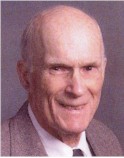John M. Wozencraft
- Birthdate
- 1925/09/30
- Birthplace
- Dallas, TX
- Death date
- 2009/08/31
- Associated organizations
- MIT
- Fields of study
- Communications
- Awards
- IEEE Alexander Graham Bell Medal
Biography
John M. Wozencraft’s pioneering work on error-correcting codes provided one of the foundations for the design of reliable digital transmission systems over the past 50 years. Coding is an integral part of today’s nearly error-free communications systems, including deep-space communication, the Internet and next-generation mobile telephony.
Based on the notion of random coding, sequential decoding was the first error-correcting algorithm whereby arbitrarily-accurate fixed-data-rate communication could be attained over noisy transmission channels with reasonable computational complexity. This approach paved the way for other algorithms that ultimately revolutionized the communications industry. It was a critical conceptual milestone in the evolution of error-correction coding from abstract mathematics to today’s palette of computationally practical error-correction techniques.
Sequential decoding became the method of choice for the low signal-to-noise ratio environment of deep space communications. It was first chosen for the Pioneer 9 deep space mission and was NASA's standard coding system for deep space for nearly a decade.
An IEEE Life Fellow, Dr. Wozencraft is Professor Emeritus at the Massachusetts Institute of Technology in Cambridge. He co-authored the book, "Principles of Communication Engineering," which sparked a revolution in how communications engineers think about digital communication. It was widely recognized as the bible of communications theory for more than two decades.
John M. Wozencraft was awarded the 2006 IEEE Alexander Graham Bell Medal “For the development of sequential decoding and the signal space approach to digital communication.”
